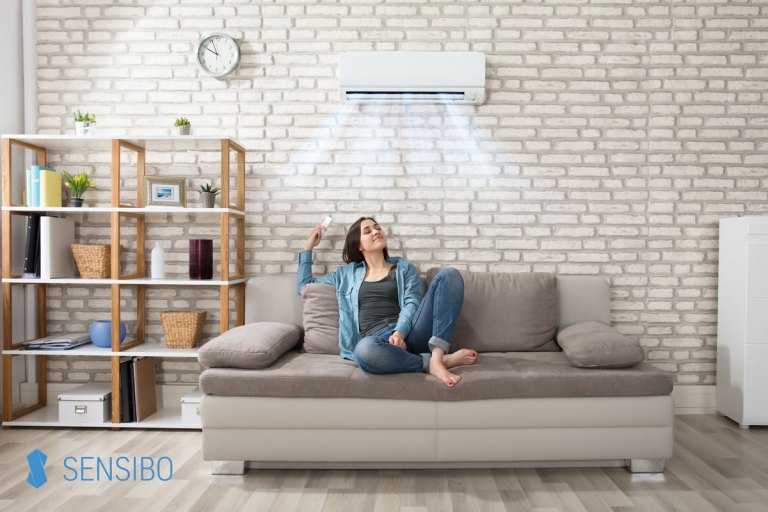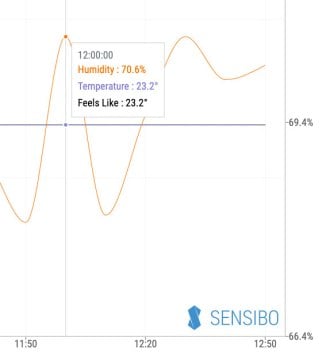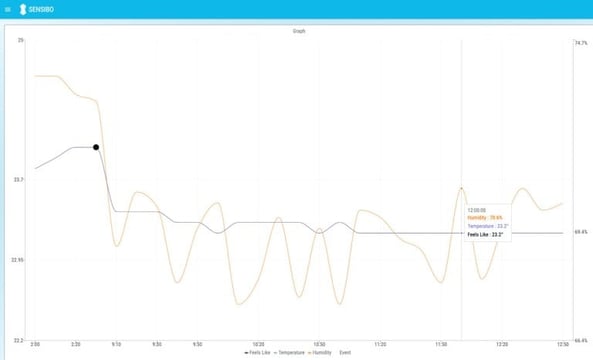How Sensibo Revolutionizes Your AC Remote

Have you ever noticed that your AC is always just shy of “perfect”? Sure, the room may be cooler, but it’s not quite cool enough; in the winter, it may be warmish, but not quite toasty enough for you?
Whether you’re looking for a way to make your AC unit work for you, keep your energy bills down or even help to save the environment, Sensibo is your one-stop solution.
The AC Isn’t A-OK: There’s More to It
Your AC is a valuable member of your home (not to mention, save your skin – literally – during the summer months), but when it comes to your personal comfort, there’s so much more than just getting the right room temperature: according to the American Society of Heating, Refrigerating and Air Conditioning Engineers, other lifestyle and environmental factors such as –
- The amount and positioning of sunlight
- the time of the day
- the weather outside
- A room’s humidity and temperature
- Your clothes
…are all important factors in your own personal comfort. Which makes a lot of sense – after all, you can’t expect your AC to help you choose your clothes for you (not yet, at least).
But, it should be able to help with those other factors. While your AC’s remote control lets you set a room’s temperature, humidity levels and maybe even a timer, if you’re lucky, it’s still a pretty simple device.
And you really deserve more from your AC remote.
What we’re saying is: your air conditioner has to work hard in order to give you what you need, and to do its job properly. And that goes way beyond just room temperature.

Sensibo Smartly Works For Your Comfort
If that’s the case – then it soon becomes pretty clear that your standard AC remote really won’t do the trick.
With Sensibo, your personal comfort is a priority. It’s all thanks to a whole range of smart AC hacking awesome features, designed just to make you feel good, not to mention – the right temperature.
For example: your AC unit can only measure the temperature only at the same height-level that it’s wall-mounted at. Unless you have a smart AC that sits next to you everywhere you go (or you are almost as tall as the ceiling), you’ll know that the temperature up there isn’t the same as the temperature at your level.
With the Sensibo Sky, the room’s temperature (and humidity) is taken at the same level that you place the device, meaning you get real-time readings that are accurate.. leading to more accurate AC actions.
It all makes perfect, personal comfort-sense.
Sensibo Hacks Your Room’s Climate
But, since your personal comfort is based on more than just a room temperature reading, you might be wondering just how else a Sensibo could really work around you.
As it turns out, it can do so in several ways: it also tracks your room’s humidity levels, as well as the ‘Feels Like’ temperature (in addition to the actual temperature):

The “Feels Like” temperature might be different to the actual temperature.
Because these three temperature readings can be so wildly different, it’s your call on exactly how you want your room to feel, and what your AC should be triggered by:

A room’s temperature and humidity change throughout the day.
And, if that weren’t enough, you can also command your Sensibo with your voice. Thanks to integrations with Siri, Alexa and Google Assistant, if you need your AC to do something – and fast! – just let your voice assistant know.
Geo-Tracking, 7-Day Scheduling, Money-Saving: & Even More Amazing Features
That’s the bare minimum of what a Sensibo Sky can do for you; check out these awesome, innovative features:
- Geo-location tracking: walking into hot, stuffy rooms is now a thing of the past: Sensibo Sky’s geo-location tracking means you can set your Sensibo to turn your AC on or off automatically when you hit a certain distance – which means the last person out the house doesn’t need to worry about accidentally forgetting to turn off the AC!
- Control your AC from anywhere worldwide: abroad and forgot to turn your AC off? Sensibo’s smartphone app lets you monitor your AC’s usage, status – and even switch off your unit if you notice it’s been left on!
- Energy (and budget) saving: If you have a set daily routine, Sensibo’s 7-day scheduling lets you set it and forget it: schedule up your AC’s on and off times, sit back, and let it do its thing.
- Filter cleaning alerts: did you know you can make your AC much more powerful and energy-efficient, just by cleaning its filters? Your Sensibo app will alert you when it’s time to de-dust, and breathe some new life into your AC.
Join the Smart AC Revolution
Our lives are growing so much more complicated and multi-dimensional – so who has the time and patience to deal with a dumb AC?
Your AC should work harder and smarter to keep up with you – and not the other way around.
Thanks to Sensibo you can revolutionize any AC unit – while simultaneously cutting your energy bills and usage.





































.jpg?height=200&name=photo_2023-12-04_19-16-57%20(1).jpg)
.jpg?height=200&name=photo_2024-11-08_11-56-41%20(1).jpg)
.jpg?height=200&name=air-conditioner-on-white-wall-room-interior-background_293060-17432%20(1).jpg)